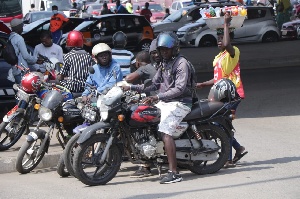- Home - Entertainment
- Lifestyle News
- Year In Review
- Music News
- Entertainers
- Entertainment Archive
- Entertainment Photos
- Jokes
- Entertainment Headlines
- Ameyaw Debrah
- Brown GH
- Celebrities Buzz
- GH Base
- Ghana Celebrities
- Gh Gossip
- GH Page
- GH Splash
- Hot Gossip GH
- YEN
Television of Tuesday, 8 April 2025
Source: www.ghanawebbers.com
Okada riders must be at least 25 years old - proposed rules stipulate
People who want to operate a commercial motorcycle or tricycle, known as ‘okada’, must meet certain requirements. They must belong to a recognized tricycle transport union or work for a licensed commercial motorcycle company.
This requirement is part of the new Legislative Instrument (L.I) being drafted. It aims to amend the existing Road Traffic Regulations from 2012 (Legislative Instrument 2180). Riders must also be at least 25 years old.
On April 7, 2025, Transport Minister Joseph Bukari Nikpe spoke at a national consultation in Accra. He said the government is introducing a new licensing system. This will help monitor commercial motorcycles and tricycles and ensure operators meet competency standards.
“Our top priority is the safety and welfare of riders and passengers,” Mr. Nikpe stated. The regulations will include mandatory helmet use, periodic inspections, and rider training.
The meeting included representatives from various organizations. These included the Motor Traffic and Transport Department (MTTD), Ghana Private Road Transport Union (GPRTU), okada rider associations, civil society groups, and transport operators.
Proposed Provisions
The draft proposes that only those employed by or belonging to licensed unions can operate these vehicles. Anyone who violates this rule could face fines or imprisonment.
Background
Motorcycles and tricycles have become essential in our transport system over the past decade. They are especially useful for last-mile journeys where traditional taxis struggle.
In some urban areas, particularly in northern Ghana, they have replaced traditional public transport vehicles. However, their rising popularity has led to increased challenges.
“We have seen more road traffic crashes involving motorcycles and tricycles,” Mr. Nikpe noted. There are concerns about safety regulations and adherence to traffic laws.
Committee Formation
Since the 2016 elections, President John Dramani Mahama promised better regulation of these vehicles for improved safety and job security for riders. Last month, a committee was formed with members from various ministries and agencies.
This committee's task was to create a regulatory framework focusing on safety and innovation for fare-paying passenger services using motorcycles and tricycles. After several discussions, they presented their draft framework on Monday.
Purpose of Consultation
Mr. Nikpe explained that this consultation aimed to gather grassroots input on the proposed regulations. He encouraged participants to discuss issues openly and suggest practical measures for implementation.
“Through this dialogue, we hope to create a strong regulatory framework for Parliament’s consideration,” he said.
Other Provisions
The draft suggests that individuals can engage in commercial operations if incorporated under specific laws as companies or unions. Operators must have a presence in at least eight regions with a minimum fleet size of 50 vehicles per region.
They must also follow an approved dress code set by regulatory authorities while meeting other conditions determined by them in collaboration with local governments.
Riders need to obtain licenses renewed every two years while unions renew theirs annually by paying fees set by authorities. Unions must also comply with an approved code of conduct.
Additionally, unions should provide annual retraining courses for their riders in consultation with regulatory authorities. All members will be registered in an electronic database maintained by these authorities.
District Assemblies' Role
District assemblies can grant permits for unions to operate locally after payment of fees and meeting specified conditions. They will designate areas as terminals within their locality as well.
Mr. Essel emphasized that unions must investigate any violations of the Code of Conduct promptly since breaches may lead to penalties.
Rider Requirements
Riders need valid commercial licenses issued by DVLA along with identification cards proving they are at least 25 years old. They must pass several tests including riding proficiency, theoretical knowledge, oral assessments, and eye exams before receiving registration marks like distinctive yellow license plates with black lettering.
They are required to wear certified protective helmets marked uniquely on the back during operation while ensuring pillion riders also have access to helmets too; compliance with all traffic laws is mandatory.











